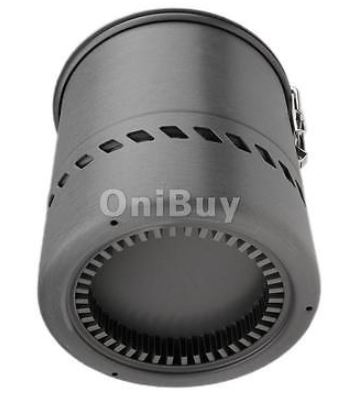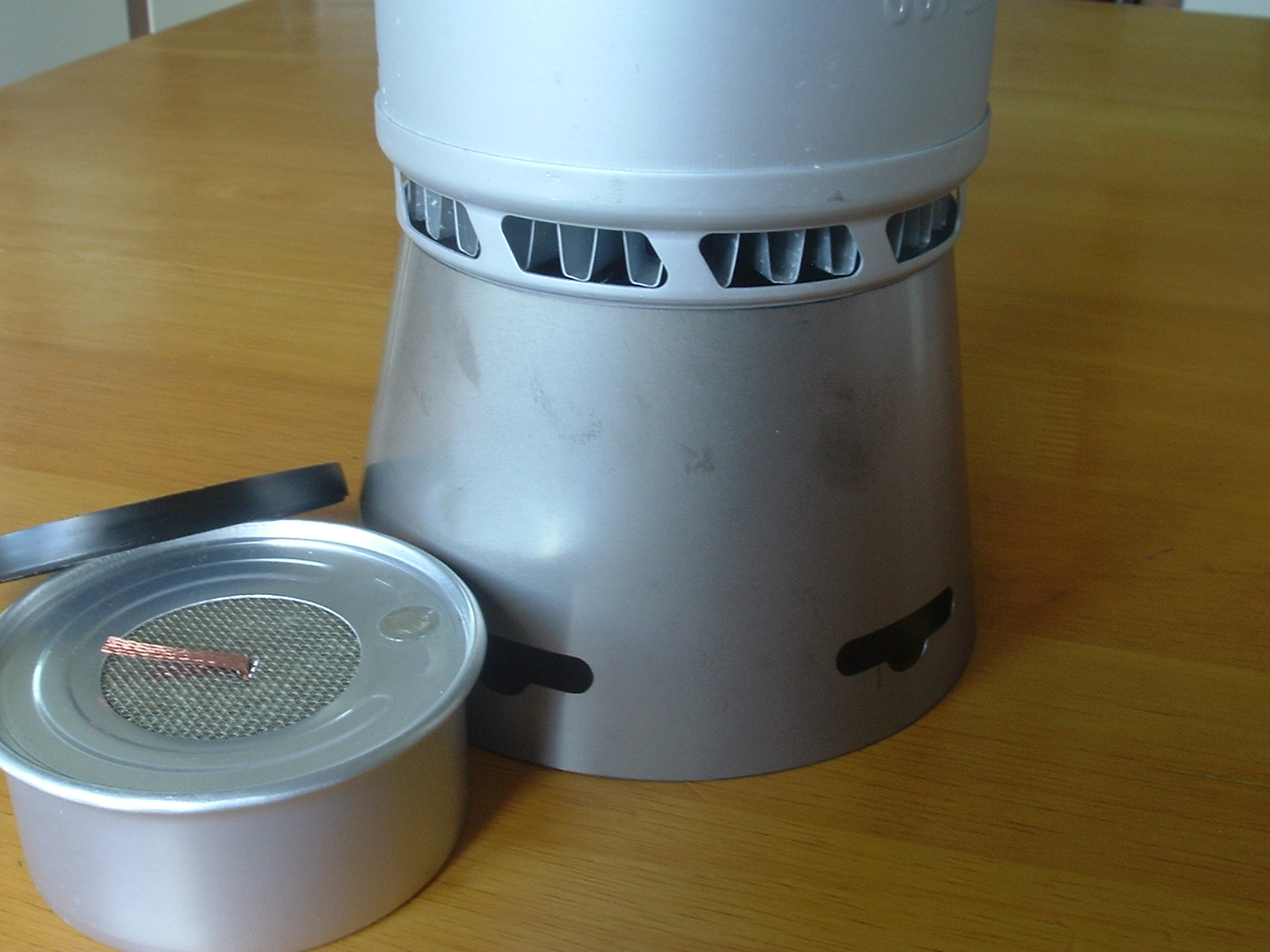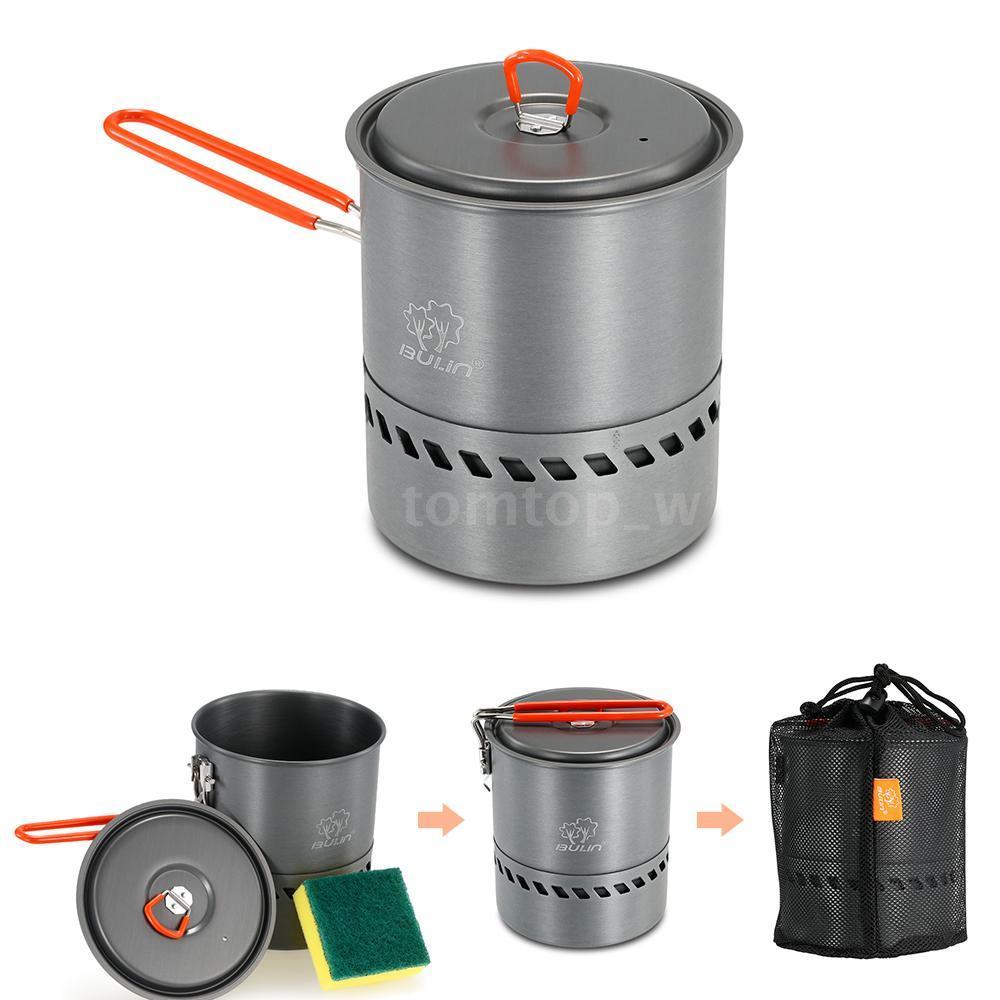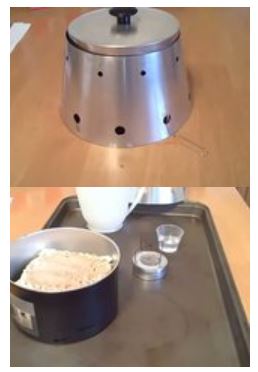Topic
Pots With Heat Exchangers
Forum Posting
A Membership is required to post in the forums. Login or become a member to post in the member forums!
Home › Forums › Gear Forums › Gear (General) › Pots With Heat Exchangers
- This topic has 287 replies, 29 voices, and was last updated 4 years, 3 months ago by
 DAN-Y/FANCEE FEEST.
DAN-Y/FANCEE FEEST.
-
AuthorPosts
-
Dec 7, 2017 at 2:59 pm #3506058
Heat-exchange fins do more than allow you to use a larger flame. And they (can) do more than just increase the surface area. Disturbing the insulating boundary layer that develops against the pot improves efficiency. HX fins (which I consider, in part, vortex generators) can do that, more pot area won’t.
I totally agree. I see the fins doing what a faucet aerator does for the flow of water out of a faucet. Mixes up the boundary layer and allows the heat to be distributed evenly up the side of the pot, especially the pot I listed in my first post. The heat is held tight against the pot for approx 1.5″ before it exits via the angular exhaust slots which create a vortex which continues to break up any boundary layer that might want to form up the side of the pot.

When my pot arrives, I’ll couple it with a Ti windscreen and the XL3 Starlyte burner and see what numbers I can get.
 Dec 7, 2017 at 3:43 pm #3506061
Dec 7, 2017 at 3:43 pm #3506061That seems like a good design feature to have the exhaust gasses flow 1.5 inches up the side of the pot, more opportunity for heat transfer.
I wonder how much of the exhaust gasses go up through the channels, and how much backs up and flows around outside the channels where the heat is lost.
If there’s a significant amount, then maybe have the windscreen touch the sides below the exhaust vents forcing all the exhaust gasses to flow through the channels
Dec 7, 2017 at 5:19 pm #3506077But wouldn’t a windscreen with a uniform gap around the pot achieve the same thing?. Hot air only goes up so the windscreen would make sure that hot air stays closer to the pot walls, improving its efficiency. Granted, as the windscreen gets too hot it will be less so, therefore perhaps having the windscreen made out of a titanium is key. I did a couple of test with the size of the uniform gap, one with 1 inch gap and another with a 0.25 gap, the narrower gap got the water hot quicker as expected. Keeping the heat at 1.5″ on the sides seems too much imho. If the gap is too wide it introduces turbulence from above the pot, specially if you don’t have too many intake holes on the bottom of your windscreen.
Dec 7, 2017 at 6:09 pm #3506082Well, the best I could do with SLX was around 3/8oz or about 10-12gm (My scale only does 2 grams at a time. It reported 3/8oz and when I shifted to metric it reported 10gm.) This was with a small stove producing a ~12minute burn to 210 degreesF starting from cold water, about 40-45F. I had an aluminum windscreen at around .25″ spacing, and, the bottom of my pot was grooved about 3/16″ in around 9 concentric rings (just to increase surface area.) This was using a 50/50 blend of ethanol/methanol. I also had an insulated blanket around the upper 1/3 of the pot and an insulated top. It was a $5 grease pot to start with. However, the burner was so small that it would have been useless in winter. Have fun, guys!
Dec 7, 2017 at 6:36 pm #3506089That’s pretty awesome James Marco. I really like the idea of your insulated blanket. What material did you use for the blanket?. Do you have any pictures of your set up?. I wonder if one was to put a carbon felt “blanket” inside the windscreen would prevent it from overheating too much and keep all that hot air inside the gap / closer to the pot walls. In all my testings I have been using 2 cups of water as that seems to be the standard benchmark, but in the field i normally use/need to heat more water, so keeping the heat closer to the walls would be even more important when the pot is closer to full. This would also be more relevant for those folks using tall an narrow pots, where the water lever “rides” higher up the pot walls.
Dec 8, 2017 at 12:33 am #3506145But wouldn’t a windscreen with a uniform gap around the pot achieve the same thing?. Hot air only goes up so the windscreen would make sure that hot air stays closer to the pot walls, improving its efficiency.
If you can get the efficiency without the windscreen you’ve eliminated one piece from your kit. The windscreen I showed is also the pot support.
Dec 8, 2017 at 1:03 am #3506148But wouldn’t a windscreen with a uniform gap around the pot achieve the same thing?
Can be difficult getting a stove to work in a 30 mph wind without a good windscreen.Me, I go for a 10 – 15 mm gap when it is windy. In really still air I am a bit more relaxed about that.
Cheers
Dec 8, 2017 at 1:09 pm #3506201Not really a fan of pics, because, they can easily be misinterpreted. Basicaly I used fibergglass insulation. What I did was to take some duct tape and press it down on regular house insulation, and then pulled the fiberglass out of the batt. I packed it around to form a “blanket” for testing. Same for the top, but I just cut that with a scissors. I think it weighed like 1.5-2oz, around half my pot/lid setup. It did not go down to cover the vent on the wind screen, about a quarter inch. Hmmmm, I think the stove is still around….let me check….Yeah, this was the old Gemini A…basically 1 larger cone with a smaller cone on top…three air vents on each cone…(sort’a looked like a Gemini space capsule.) Very efficient but generally worthless in colder weather. Lost heat to ambient air was a BIG problem, hence the insulated blankets, but this was actually a failure. Too fiddly and too many parts…typical of test rigs… I think this is 10-15 years old. All .002 brass shim stock as I remember…might have been .003 on the upper cone… I was testing for efficiency (ie fuel x heat absorption, not time or weight.)
Dec 9, 2017 at 11:10 pm #3506554Like Dan, I ordered one from eBay on 2017-11-24 out of Guangdong, China for $24.92. It arrived on 2017-12-8 (2 weeks).

Tossing aside the box, plastic bag, 30-gram mesh bag, and the scrubbie sponge, left 313 grams (11.0 ounces) of pot, handle and lid. The 44-gram handle is a bit bothersome to detach, but I did it with no tools. Filing off a retaining tab would make handle removal and replacement easy. The 43-gram lid has a nice, plastic-coated handle that is appropriately stiff (so it stays upright when you want it. That leaves the pot-only at 226 grams (8.0 ounces).
Squeezing the top edge of the pot between the thumb and forefingers of both my hands, I can’t bend it. Using both my arms, elbows out, pushing my palms together, I could, but barely. i.e. it’s pretty sturdy. If it was at the edge of my pack, I wouldn’t drop the pack onto a rock from 10 feet up, but in normal use it doesn’t need any protection and could protect 1.5 liters of stuff inside of it.
It’s a very functional handle. It folds and clicks into place across the top of the pot and secures the lid. And rotates 180 degrees, firmly clicking into place sticking straight out, horizontally. But then, that handle weighs 160% of what my stove does.
Speaking of a BRS-3000T, it fits exactly inside the heat-exchange fins (i.e. the pot bottom rests on the stove pot supports. So I like the height above the burner and I expect that most of the hot exhaust gases will pass through the HX fins and on up the channel around the bottom portion of the pot.
I’ll post results when I fire it up and check fuel consumption.
Dec 9, 2017 at 11:24 pm #3506556I need to recheck weights on my other mid-sized HX pots, but this seems on the heavy side.
But for $25 plus a $12 BRS-3000T, it would make a fabulous bit of emergency kit in a car trunk, student dorm, car camping or around the house. I’d estimate JetBoil-like speed and efficiencies (or maybe a bit better). It’s as light (but far cheaper and twice the capacity) as a JetBoil Zip Cooking system, and lighter, higher capacity, and far cheaper than JetBoil Flash, MiniMo and MicroMo systems.
Dec 9, 2017 at 11:45 pm #3506558How amusing.
Remove wire handle from lid and replace with a knob. Slightly tweak the design of the handle on the side. You now have a pot which looks identical to the MSR Reactor pot. Of course, the MSR one must be superior: it has a nice sticky MSR label on the side. One wonders who made the MSR one? :)I note that the 1.7 L MSR unit with the Reactor stove is over $400 on eBay, while MSR does not seem to list that size. MSR lists a 1 L unit at $200. Very odd. Both are a far cry from $37.
At least, with the BRS-3000 stove you should not be getting the near-lethal CO levels the Reactor gives off. That has to be a benefit.
Cheers
Dec 11, 2017 at 3:35 am #3506778Not to pee in anyone’s Wheaties but the Chinese pot might have lead and other undesirable metals in it (hence the $37. price). It happened with SIG Tourist knockoffs in the ’80s.
Dec 11, 2017 at 4:30 am #3506785Hi Eric
I am not an expert metallurgist, but I have worked with Ti alloys a little. I have never heard of an alloy of titanium and lead, and find it hard to imagine anyone going in that direction. It would destroy the advantages of Ti.
Actually, the whole Ti alloy manufacturing process simply excludes almost any chance of lead getting in, so finding even an accidental lead alloy would be extremely difficult.
Since most high-tech Chinese companies love to sub-contract to Western companies, I have very serious doubts that they would even contemplate using a Ti alloy with lead in it (even for their home market). The cost of the raw material is not that high compared to the processing cost.
Actually, I rather suspect Fletcher was swallowing and repeating a myth when he talked about lead in a SIGG Tourist kit. The brazing on the stove is one thing, but the pressed SS pot – HA! Another myth.
As to the price – what is strange about that? The Chinese make a pot for $20, sell it direct to the West for $40, Western companies then buy it for $25 in a 1k lot and mark it up to $75 to the consumer. That is absolutely standard commercial practice in the West. Come in sucker.
Cheers
Dec 12, 2017 at 1:07 am #3506978My pot arrived today. did 2 tests
4 cups water used in both tests
denatured alcohol was the fuel of choice
Starlyte XL3 burner was used as stove choice
Pot support was the one that came with the Sterno Inferno kit as seen in another thread.
1st
74 degree start water temp and 62 degree air temp
22 grams of fuel used to boil the 4 cups
16 min. to bring to rolling boil
2nd
68 degree start water temp and 58 degree air temp
20 grams of fuel to boil 4 cups
19 min to bring to rolling boil
I used a United States Postal Scale to weigh burner before and after test
Digital timer used for timing.
More tests tomorrow.
Pot is said to be made of magnesium/aluminum alloy
Note: 1 fluid ounce weighs 24.2 grams
So….less than 1/2 ounce of fuel used to boil 2 cups of water if you want to look at it that way.
Pot only, weighs 265 grams or 9.4 ounces and yet 4 cups were able to be boiled efficiently with less than 1 ounce of fuel.
Dec 12, 2017 at 2:10 am #3506986I’ve done a single test on mine, using a BRS-3000T on a pretty low flame. 505 grams of water, 4:30 time, 70F water to 210F, inside the garage at 71F, 5 grams butane-propane mix.
The exhaust gases coming out of the side vents was remarkably cool throughout.
Dec 12, 2017 at 2:30 am #3506989I was able to hold my fingers near the exhaust holes while it heated the pot/water up until the water was very hot. I was impressed to say the least.
Dec 12, 2017 at 10:43 pm #3507147Does the bottom of the pot look like in the picture on top of this page (post 51 of this thread)? Otherwise, do you mind taking a picture of the bottom of the pot, so we can see the HE-fins.
I am asking because pictures of the bottom of the MSR Reactor pot 1.7l look quite different. link
or is that just a new/old model difference and the new MSR Reactors look like this pot?
Dec 12, 2017 at 11:55 pm #3507162Roger,
I see the pot in question is a “magnesium/aluminum alloy” and I was thinking it was mainly aluminum, not titanium. That’s where I felt it could possibly contain traces of lead, in the aluminum. *Here’s hoping it’s a food safe alloy, which it most likely is.
On the HX topic, I think the last word of HX design is still to be written as companies try for yet more fuel efficiency. Perhaps even the Caldera Cone design will be tweaked for even more efficiency. (fingers crossed)
Dec 13, 2017 at 12:11 am #3507166Hi Eric
Aluminium is made by electrolytic smelting of refined bauxite ore. You just don’t get lead contamination in such material. Well, not above the parts-per-billion level anyhow.
Considering the number of aluminium saucepans and aluminium baking trays and … used in kitchens, unlikely.
Cheers
RogerDec 13, 2017 at 3:43 am #3507191Does the bottom of the pot look like in the picture on top of this page (post 51 of this thread)? Otherwise, do you mind taking a picture of the bottom of the pot, so we can see the HE-fins.

Perhaps even the Caldera Cone design will be tweaked for even more efficiency. (fingers crossed)
You must be related to those guys in some way….married your sister? Went to school with them?
Today’s quick test results:
4 cups water boiled each test
1st
24 grams fuel used
20.5 min.
start water 66/air 572nd
22 gr fuel used
19 min 40 sec to boil
start water 61, air 553rd
19 gr fuel used,
18 min 20 sec to boil
start water 58, air 54Dec 13, 2017 at 10:47 am #3507244Dan, yup. This is roughly the same as I got without the weight of an HE. 10gm for two cups is very close…
Dec 13, 2017 at 3:36 pm #3507258James, did you notice the decrease in the grams of fuel used and time to boil in the 3rd test?
3rd
19 gr fuel used,
18 min 20 sec to boil
start water 58, air 54When I went to remove the pot from the pot support I noticed the pot was teetering on top of the pot support. One side of the support was letting oxygen enter under the HX fins. Does the system need more oxygen???? Oh the joys of experimental stove design :-) I’m going to do more tests with the base that came with the Inferno pot. It has additional air intake holes. We’ll see if that additional oxygen/burn rate makes a difference as I saw in the results of the 3rd test. I like how the Starlyte XL is performing inside the enclosed windscreen, no radical burning(overheating) going on.
Dec 13, 2017 at 4:01 pm #3507269Dan, Thank you for doing these tests.
Like James, i’m not particularly impressed with the results. I just boiled 4 cups of 61F water in 12 minutes on a grease aluminum pot. It took 24gr of denatured alcohol and i used a DIY conic windscreen (a la caldera cone). The pot and windscreen (which also works as pot support) combined weight 4.7oz…. so lighter & quicker. Also I bet your results would be affected if tried on the field since you don’t really use a windscreen, so all that hot air escaping the lower vents and riding the outside walls of your HX pot would cool down rather quickly even with a very light breeze.
Dec 13, 2017 at 4:21 pm #3507279here a picture of the set up.

Pot is a grease aluminum pot, windscreen is made out of lightweight aluminum and shaped as a cone (sloped not as aggressive as the caldera cones) and I forgot, to mention in my previous post, my setup also includes a carbon felt “hat”. All that weights 4.7oz. I did 4 cups just to compare with your results, but that fills the pot all the way to the brim, so realistically this pot would be good up to 3+ cups so water does not spill over when it comes to a hard boil.
Edit: and just to make sure there was not weighting error, I folded the windscreen and put it inside the pot, so it sat nicely on top of the scale… still 4.7oz
 Dec 13, 2017 at 8:39 pm #3507329
Dec 13, 2017 at 8:39 pm #3507329Mario, I use the grease pot all the time for 4 cups of water and a conical windscreen plus a Starlyte(regular) stove to support the pot. I eventually put a ridge on the pot and supported it with a conical windscreen.
I wanted something larger to cook for 2 people. I saw the 1.5 litre pot on amazon and thought it might work out well for future use. I bought one and I’m just beginning to test it. As time goes on, I’ll reduce it’s weight with a titanium windscreen/support and maybe include a ti windscreen to cover the entire pot side to ensure a efficient boil.
I like the sturdiness of the pot, also the handle is well built and has a firm/safe feeling when pouring 4 cups of water. When I fill the pot to max water volume and go to pour it out I’m sure the handle will work well. The grease pot just does not fill my 2 person meal needs.
My zmart kit as used in the past:

-
AuthorPosts
- You must be logged in to reply to this topic.
Forum Posting
A Membership is required to post in the forums. Login or become a member to post in the member forums!
Our Community Posts are Moderated
Backpacking Light community posts are moderated and here to foster helpful and positive discussions about lightweight backpacking. Please be mindful of our values and boundaries and review our Community Guidelines prior to posting.
Get the Newsletter
Gear Research & Discovery Tools
- Browse our curated Gear Shop
- See the latest Gear Deals and Sales
- Our Recommendations
- Search for Gear on Sale with the Gear Finder
- Used Gear Swap
- Member Gear Reviews and BPL Gear Review Articles
- Browse by Gear Type or Brand.









